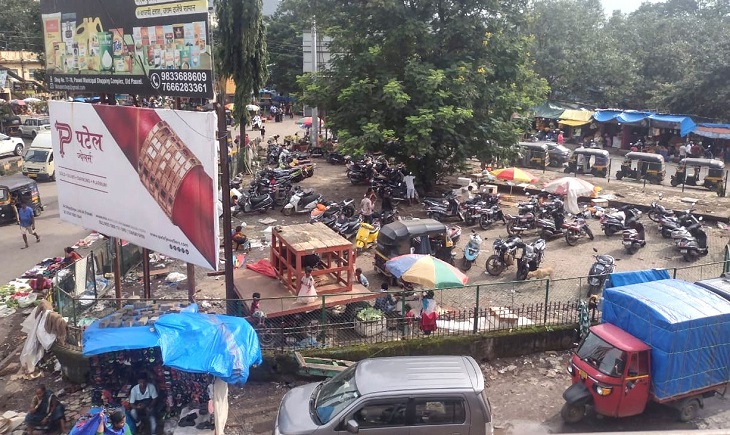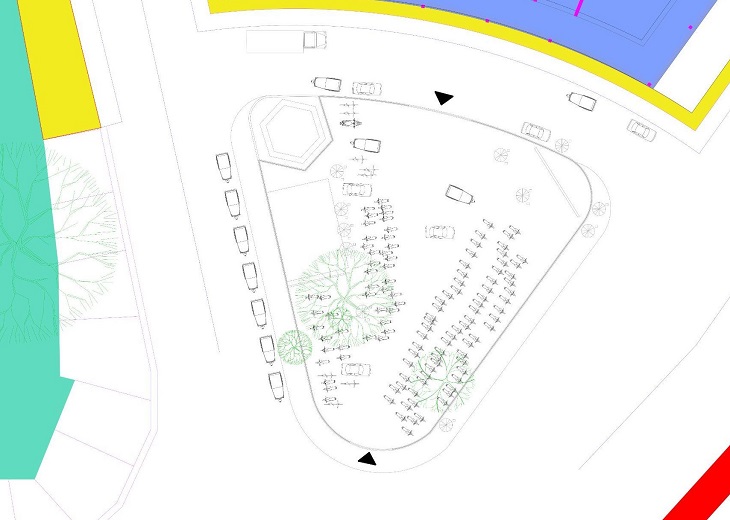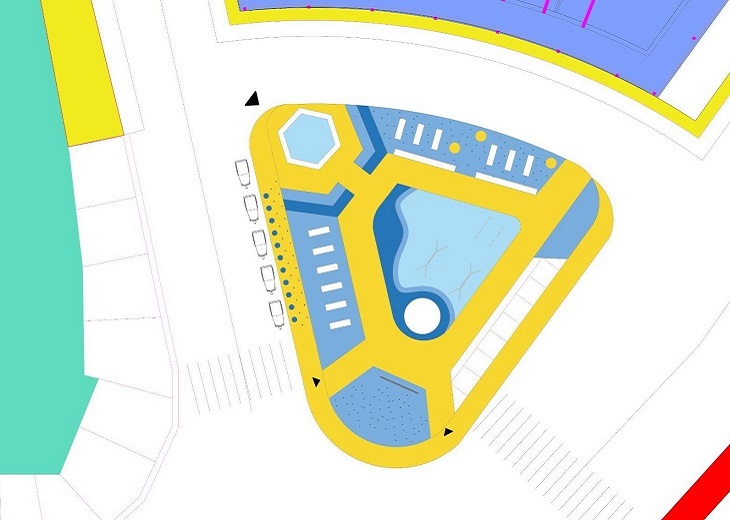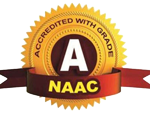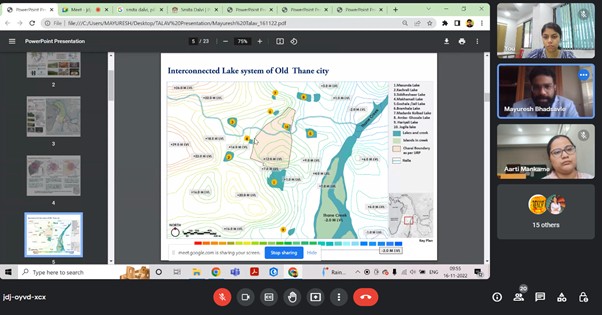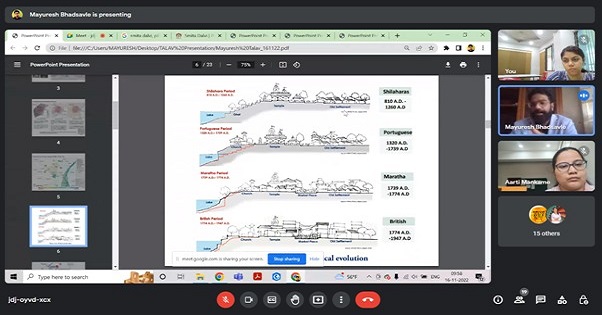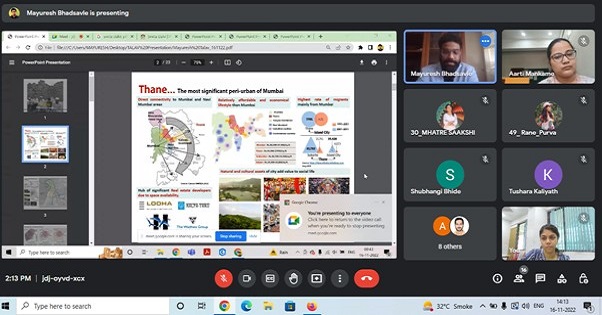| Subject | Allied Design - Sem 9 Urban Design |
| Year | 2022 |
| Date | 14th - 18th November, 2022 |
| Time | 9:30 a.m. - 3:30 p.m. |
| Venue | On-Campus |
| Co-ordinator | Prof. Bhagyasshree Ramakrishna |
| Faculty | Snehal Garg, Aarti Mankame , Tushara Kaliyath |
| Participants | 73- Merlin Minu Kuriakose 41-Patnekar Atharva 68- Vibhandik Sanket 49- Rane_purva 64- Tawde Komal Ganpat 30-Mhatre Saakshi 15- Jadhav Dhiraj |
Workshop Aim:
A 5-day certification workshop was conducted for the final year B.Arch and M.Arch students of Pillai college of Architecture with the intention of opening avenues for dialogue on various aspects of lakes in Panvel (Panvel Municipal Council limits, specifically the old Panvel area). The intent was to also integrate the students with the faculty research (COA-USRP) and participate in discussion that is in continuation with their previous studios dealing with lakes and city expansions. The workshop aimed at inviting guest speakers and obtaining critical insights in their work and gauge new perspectives within areas of similar research. The workshop aimed to engage the students with the community, and critically examine socio-spatial relationships of society and their water systems. With the purview of the workshop aiding the larger COA- USRP (Urban Studio Research Project), the focus site was situated at Krishnale Talav. The dialogues aimed to, additionally, critique the process of management of the Talavs in Panvel, by way of documenting the history and present context.
Workshop Objectives:
- To provide a Historical overview of Panvel’s urban form impacted by socio-cultural aspects.
- To examine the evolution of lakes, their historical and current socio-cultural associations.
- To allow for new learnings and dialogue by way of guest lectures
- By conduct community-engagement surveys and interviews
- To critically evaluate lake edge and precinct.
Learning Objectives:
- To enable sensitivity towards smaller water-bodies as a part of the ‘urban’ in growing urban areas.
- To familiarize with community-engagement as a method for critical study
- To be able to familiarize with concepts of tangible and intangible socio-water associations
Day 1: 14th November, 2022
Dr. Smita Dalvi: (on-campus Lecture and Discussion):
- Title: “Pages from Panvel: the fading Heritage of a Medieval city”
- Significance of the Topic:
The lecture was excerpts from Dr. Smita Dalvi’s book titled “Panvel: Great City, Fading Heritage”. The intention was to familiarise the students with the historical significance of Panvel and linking the systems of water bodies to spatial transformations.
- Gist / points covered in lecture
The lecture took us through various lakes (5 key lakes) and their sacred associations with water. The lecture presented a detailed account of the emergence of a unique architecture in that region with respect to the diversity of religious communities, their identities. The idea of a ‘cosmopolitan’ landscape in historic Panvel was discussed as a unique integrated identity, where the architectural facades of differing religious buildings shared regional identities. The final section of the presentation deliberated on the present condition of the Talavs- the concretisation of the lake edges, the loss of heritage memory and challenges of lake pollution and maintenance.
- Brief takeaway of the lecture
Key discussion points opened up conversations of what values do current urbanisation practices have with water systems? The students posed questions of what and for whom does the new development serve? Do jogging tracks dimension the local heritage community values? What does recreation- physical/ecological/social- look like in context-specific lake edges? There was a debate on the role of the new generations in preserving local heritage. Could the loss of heritage memory be revived through spatial design? Can heritage walks facilitate awareness? How can tourist walks integrate built-heritage, communities and the lakes?
- Photographs of the lecture
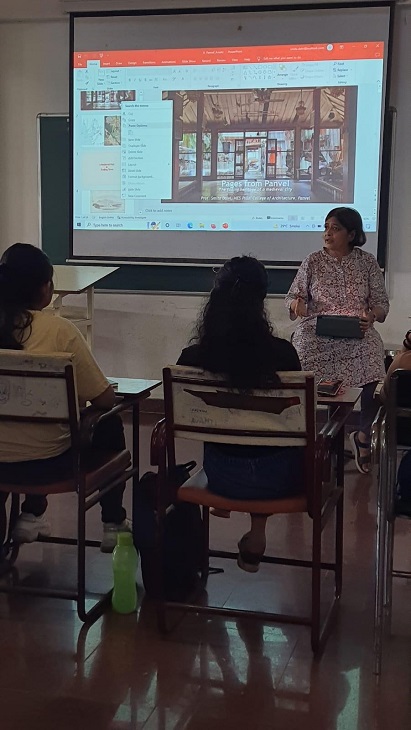
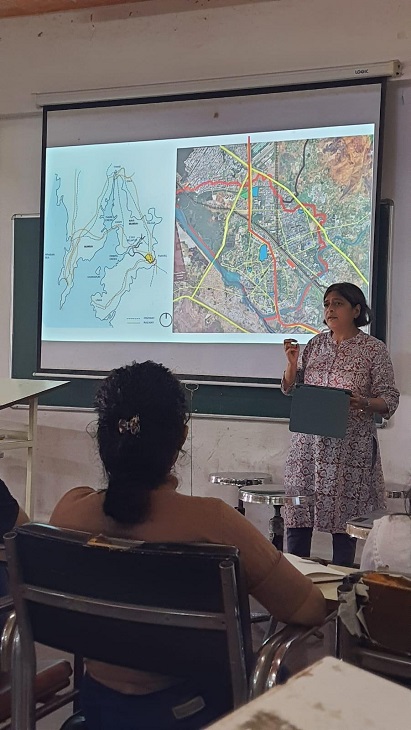
Saddam Sayyed (Final Year Master’s Student, Pillai College of Architecture)
- Title: Panvel’s Historical Evolution: Urban Form and Communities
- Significance of the topic
His first semester M.Arch. work was situated in Old Panvel, where his team and he analysed the historical evolution of the city in detail. The intent of this lecture was to present a broad, yet detailed account of Panvel’s history through the lens of urban form- maps and diagrams.
- Brief introduction of the guest
Saddam is a student of Urban Design M.Arch. His family is a part of the local community dating back to several generations. Saddam’s family have been historically associated with Panvel and he has witnessed transformation in the city and has documented oral narratives of socio-cultural aspects, political changes and urban management initiatives.
- Gist / points covered in lecture
The lecture examined the settlement of various communities through a historical timeline. He critically linked areas of the city with respect to specific communities and their activities. With the help of oral narratives, older city boundaries were delineated and an estimated evolutionary boundary was drawn out. The original boundaries of the water bodies were also estimated and mapped. He also discussed some of the historical evolution of community occupations.
- Brief takeaway of the lecture
The historical values of certain streets, their pathways, open spaces and lakes linked to community socio-economic practices was discussed.
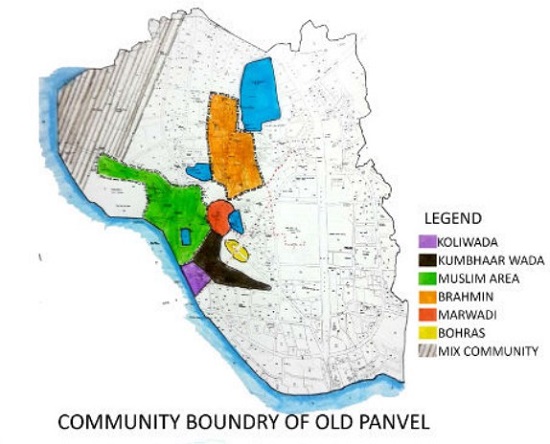
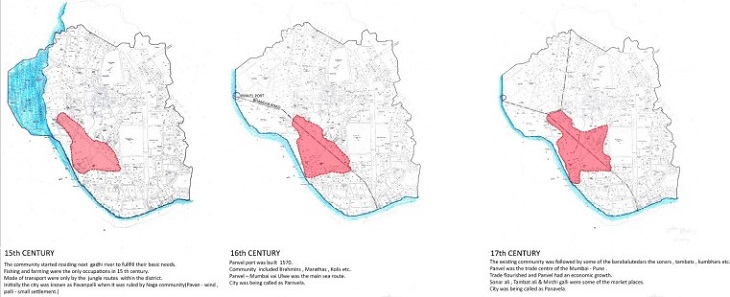
- Photographs of the lecture
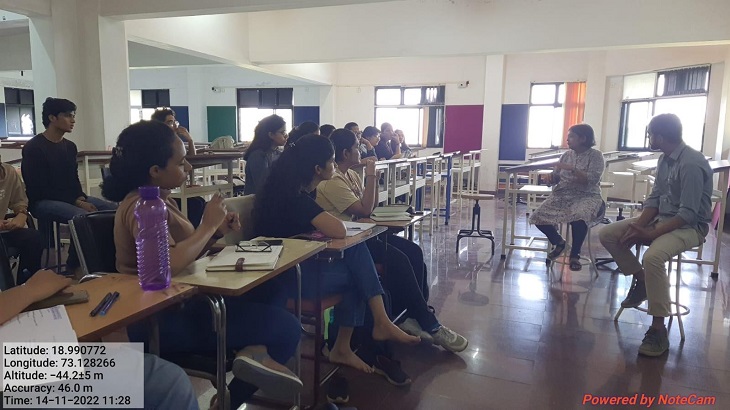
Workshop Task 1: Preparation of Basemap
Aim: To digitise Building footprints, use and heights and build the basemap of Panvel Muncipality Area by the attendees. One student prepared the sketchup model of Krishnale Talav Precinct.
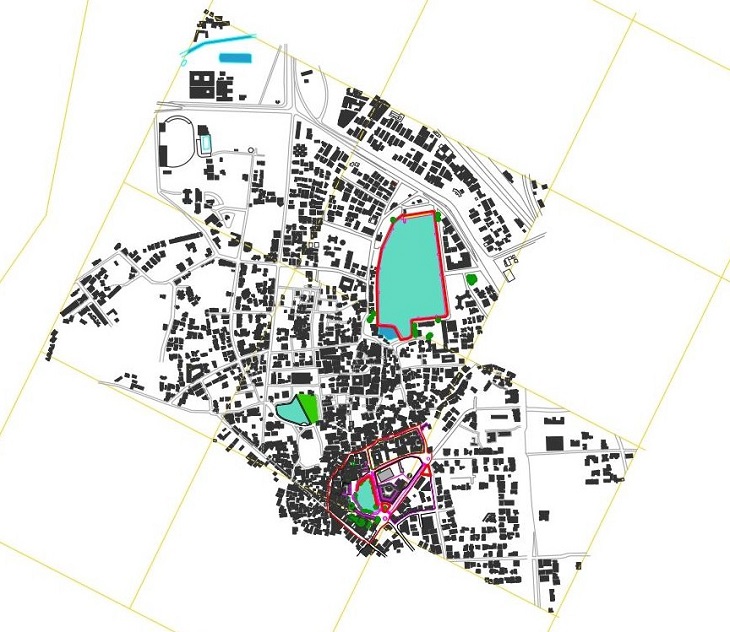
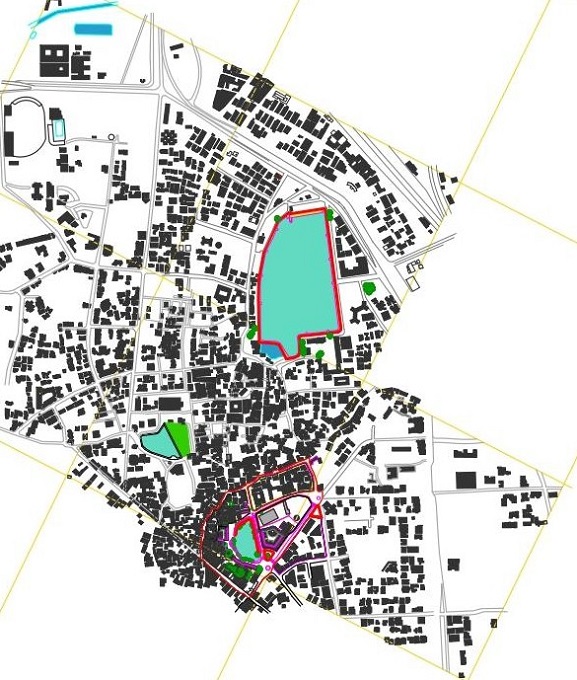
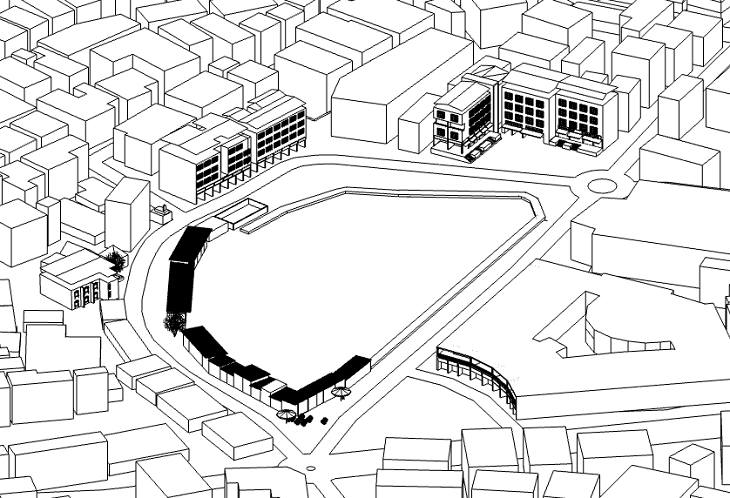
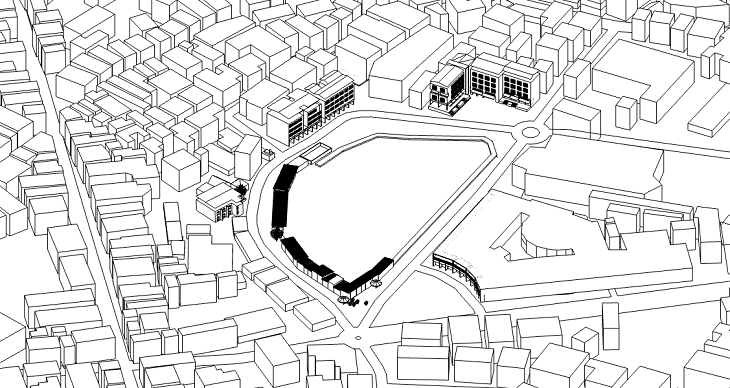
Day 2: 15th November, 2022
Workshop Task 2: Identifying Water-Spatial Linkages.
Brief: In groups, use the old maps to highlight key aspects of tangible and intangible linkages with aspects of water. Identify your focus, build a narrative and annotate on the printed out maps.
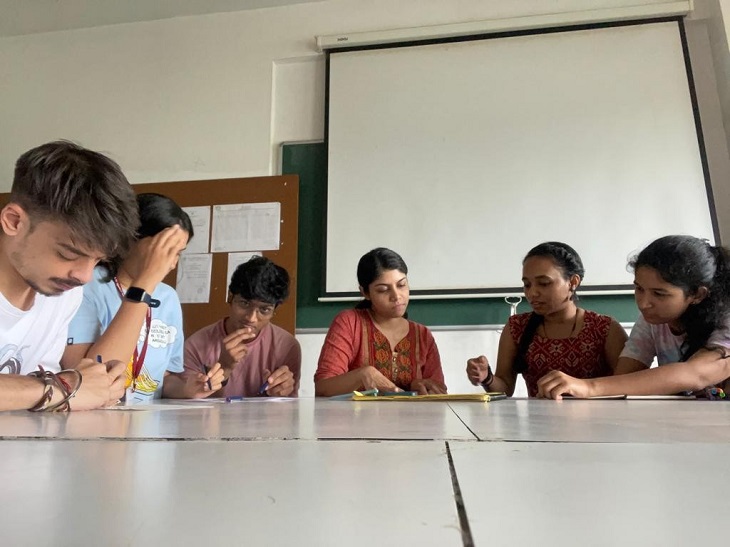
Day 3: 16th November, 2022
Mr. Mayuresh Bhadsavle (Urban Policy Practitioner)
- Title: TALAV: Transforming and Appropriating Lakes through Awareness and Volunteerism”
The guest lecture was conducted in a hybrid mode- online as well as on-campus.
- Significance of the event/topic:
The area of research presented is closely linked to the USRP work on Talavs of Panvel. The research work done by the guest speaker is based on Talavs of Thane. Thane and Panvel share similar histories, urban form and socio-cultural associations with small man-made lakes. The few of the key aims of the guest lecture was to evaluate the similarities and differences between Thane and Panvel, assess the lakes engagement process adopted in Thane- the challenges, successes in advocacy measures.
- Brief introduction of the guest:
Mr. Mayuresh Bhadsavle is an Urban Policy Research and Development Practitioner engaged in Climate Change Adaptation, SDGs, Urban Livelihoods, housing and water. He founded a civic initiative ‘TALAV’ – for implementing UN SDGs at the grassroots.
A brief about TALAV – (Transforming and Appropriating Lakes through Awareness and Volunteerism) – is a citizen initiative to reestablish the connection between the city and its water bodies. TALAV was started to facilitate the conservation of ‘Lakes as Public Spaces’ through engagement with local communities, government institutions and the student fraternity. Basis the three pillars of Awareness, Advocacy and Volunteerism, TALAV worked to mainstream the marginalized lakes and public spaces in Thane.
- Gist / points covered in lecture / event:
The lecture began with a brief analysis of History of Thane, its geographical and topographical position, and an overview of rulers, community implications. A detailed account of Masunda Lake was examined from the lens of its lake edge modifications timelines by different rulers. The second section of the lecture discussed some of the urban management and governance processes followed by the TMC (Thane Municipal Corporation), the implications of the Thane Smart city mission on lake rejuvenation projects and stakeholder perceptions. Finally, the guest speaker discussed the nuances of his initiative in enabling lake awareness activities, events and the role of local media in driving volunteer-centric lake renewal projects.
- Brief takeaway from the lecture:
1. Historical associations with water have spatial implications. The historical timeline of Thane demonstrated that the various rules (authorities) agenda was reflected on the changing Masunda lake-edge. The present context abruptly discards these historical narratives.
2. The shrinking of lakes is associated with mismanagement of land-water relationships.
3. Tourism of small-water bodies needs revival. This can be done by enriching research on local narratives, conserving built heritage, architecture and lake edges.
4. The municipal corporation should be sensitised on development implications and negative impacts on communities. Rapid development can not only mar some of the historical evidence, but also delay context-sensitive design responses to the lake edge.
Invitation Poster
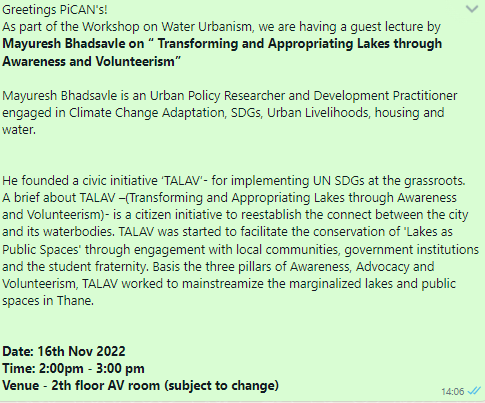
Screenshots in case of online lecture
Day 4: 17th November, 2022 Community Interviews Maps
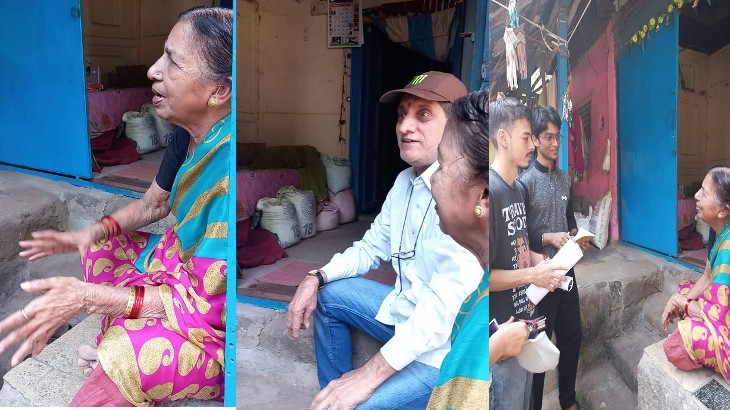
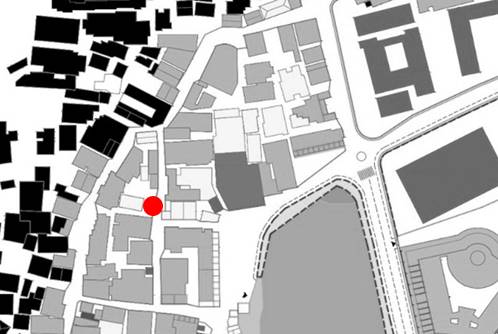
Interviewee 1:
Did not go to the lake earlier
It was bigger, but there was no purpose and would The well – used for washing clothes
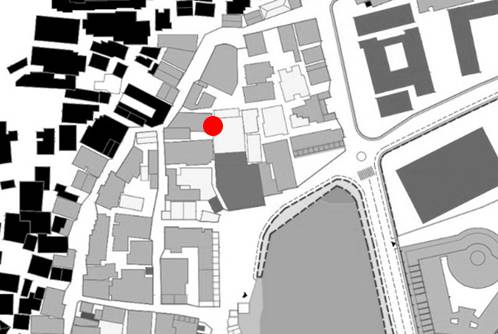
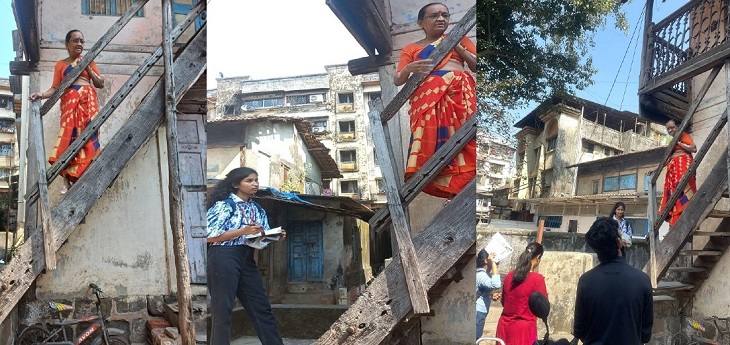
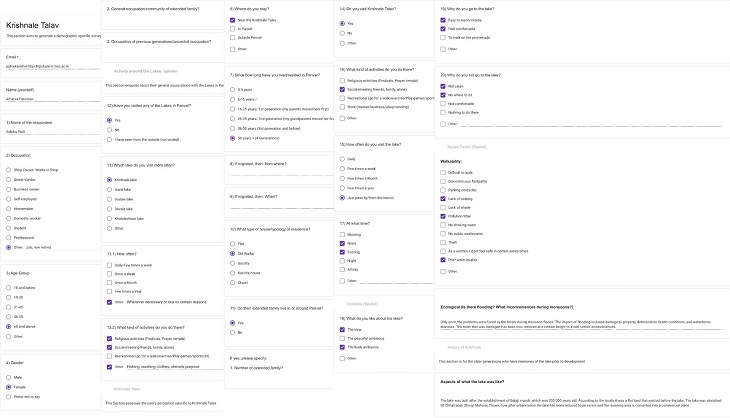
Day 5: 18th November, 2022 Compilation of work and review
Group 1:
Komal, Sakshi, Merlin
Group 1 students analysed the transformation of Dewale talav, identifying significant markers/landmarks, and questioning the lake reclamation to a park with generic activities.
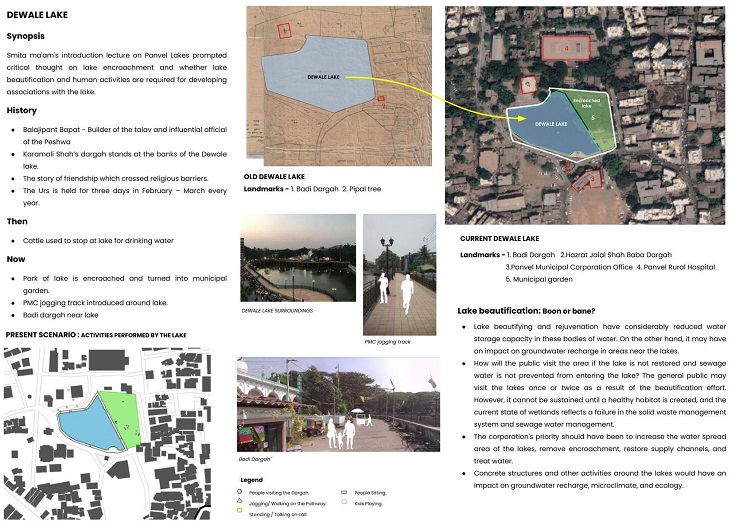
Group 2:
Atharva, Sanket, Purva
Group 2 analysed the edges of the Krishnale Talav and the socio-spatial linkages. They traced the paths that communities used historically and compared them to the present context. They analysed an existing ‘water well’ privately owned by a house located in one of the internal streets of the lake. The students traced the route of carrying the water to and from the well to the shops and houses. The well as a point for washing social gathering, especially for women, who traditionally would not loiter in public spaces.
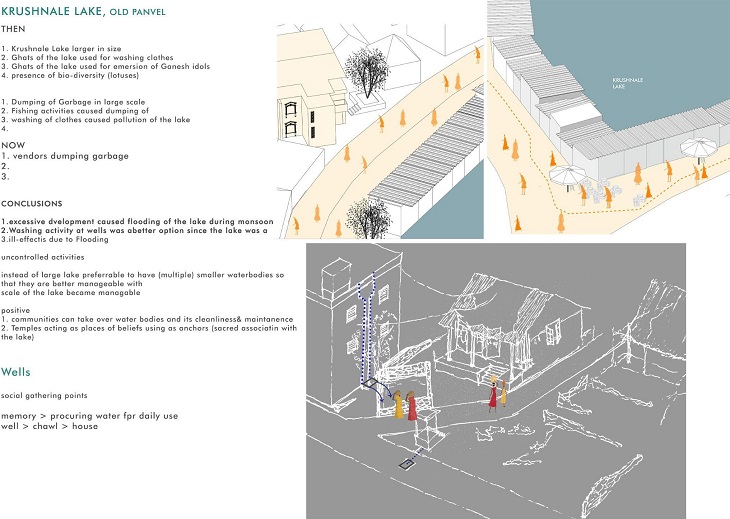
Student Work: Dhiraj Jadav
Dhiraj analysed the traffic island, key activities and stakeholders and proposed steps to transform the space using tactical methods of minimal interventions.
